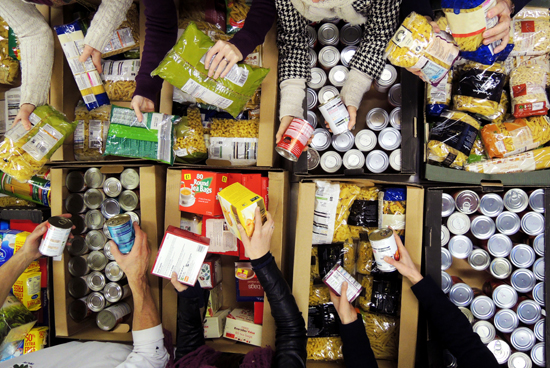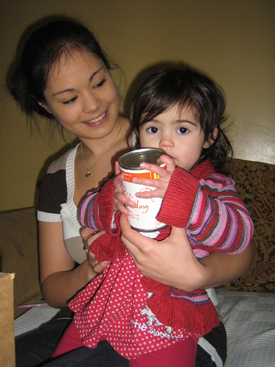One of the most shocking statistics of recent weeks has been that 1,084,000 people have visited food banks over the past year.
The proliferation of groups distributing food to people in need is a relatively recent phenomena. In 2010, there were just 54 food banks providing food parcels to 41,000 people. Today there are 445 such outlets.
 The impressive report of the All Party Parliamentary group on food poverty, Feeding Britain, which was published in December, recommended reforms of the benefits system and the implementation of a living wage as measures to tackle hunger. But it also suggested the creation of super-food banks, and the idea that supermarkets could redirect some of the 4.3 million tons of food that goes to landfill every year to food aid.
The impressive report of the All Party Parliamentary group on food poverty, Feeding Britain, which was published in December, recommended reforms of the benefits system and the implementation of a living wage as measures to tackle hunger. But it also suggested the creation of super-food banks, and the idea that supermarkets could redirect some of the 4.3 million tons of food that goes to landfill every year to food aid.
That would mark another step along the road to institutionalising food banks as a permanent part of welfare provision.
The example of what has happened in Canada provides a salutary lesson. Food banks were introduced there in the early 1980s, during what were perceived as tough economic times. There are now 700 of them in Canada, providing help to 800,000 people. The number of people visiting them has increased by nearly 100,000 over the past six years – as the country has come out of economic recession. There were an abundance of low-income jobs created as part of the economic recovery.
 Graham Riches, emeritus professor and former director of the School of Social Work at the University of British Columbia, says food banks have become a second tier of the benefits system in Canada. “The sad fact is that in Canada, with its 30-year track record of increasingly corporatised food charity, recent national data shows that one in eight households or 3.9 million individuals are still experiencing food insecurity,” said Riches. He argues that the institutionalisation of food banks has led to the depoliticisation of the issue of hunger, leaving the problem to be dealt with by community and corporate charity. Writing in the Guardian, Riches suggested that a right to food should be entrenched in domestic law backed by international statute, then the obligation to deal with hunger would be put fully back under the responsibilities of the state.
Graham Riches, emeritus professor and former director of the School of Social Work at the University of British Columbia, says food banks have become a second tier of the benefits system in Canada. “The sad fact is that in Canada, with its 30-year track record of increasingly corporatised food charity, recent national data shows that one in eight households or 3.9 million individuals are still experiencing food insecurity,” said Riches. He argues that the institutionalisation of food banks has led to the depoliticisation of the issue of hunger, leaving the problem to be dealt with by community and corporate charity. Writing in the Guardian, Riches suggested that a right to food should be entrenched in domestic law backed by international statute, then the obligation to deal with hunger would be put fully back under the responsibilities of the state.
The Canadian example illustrates what could happen here, with the voluntary and charitable sector being used to effectively take over the role of providing the safety net previously provided by the welfare state.
This scenario could also promote the grotesque situation of supermarkets gaining PR cudos for supporting foodbanks while paying their staff so badly that they themselves need food hand-outs. Citizens UK said earlier this month that Tesco, Sainsbury, Asda, Next and Morrisons do not pay the living wage.
It comes down to the struggle for justice as opposed to charity. Many people are happy to offer charitable assistance to foodbanks but this should not be to the exclusion of asking why, in one of the richest countries in the world, more than one million people have had to go to one.
The long-term goal should be shutting foodbanks down because they are not required anymore, not creating bigger and better versions of them.
Paul Donovan is a freelance journalist
Photos: Trussell Trust


 Loading ...
Loading ...
What do you think?
You can post as a subscriber user ...
User comments (6)
Just a couple of points. 1. while the Trussell Trust figures might 'overstate' the number they help, they take no account of the people helped by foodbanks that are not part of the Trusell Trust networks. Some believe that there may be as many if these again as TT ones. Most of these are church based. 2. I agree that historically the church has had a role in helping the poor and disadvantaged. However, what we're seeing now are politicians deliberately forcing people into food poverty, knowing that Christian - and other - groups with a conscience will have to move in to help.
This is more complex than it initially appears. The numbers are misleading in terms of the level of need out there as many food banks only allow for 3 visits per person per year, therefore the need is much greater than the figures suggest.
It is immoral that working people should be earning so little that they are in food or fuel poverty and have to rely on top up benefits. Shame on any incoming government that fails to bring in a living wage and shame on businesses which put shareholders interests above their moral obligation to pay a fair wage to their workers. While I'm at it, shame on the government for outsourcing the fitness for work assessments to a profit making company.
I work at a busy drop in centre for homeless and vulnerable people and see first hand the chaos caused by welfare sanctions, most of which seem to be reversed after appeal. By the time it's sorted a couple of weeks will pass without electricity or money for food.
We need food banks, but only because of the demonisation of the poor and the greed of the rich.
Getting off my soapbox now!
Foodbanks are normally for emergency use whilst benefits are sorted out or a crisis dealt with.
The reality in the UK today is that benefits are often stopped/sanctioned, that utility bills are rising, jobs becoming more difficult to find, employers are increasingly using zero hours contracts or not paying a living wage.
Is aussiemike really saying people should be kept poor so that Christians can feel good about helping them?
If you live in the UK go and volunteer in a Citizens Advice Bureau or food bank. When you understand what it’s like to have to be grateful for a few tins of whatever Christians feel the poor should live on, then comment.
Surely, as a Christian, one should aim to give a hand up not a hand out.
"One of the most shocking statistics of recent weeks has been that 1,084,000 people have visited food banks over the past year."
Shocking because NOT TRUE. The 1,084,000 figure comes from taking the number of vouchers given out by the Trussell Trust and multiplying that by how many people each voucher can feed. Since one person can be given more than one voucher per year, the headline figure is very misleading, because it isn't a measure of unique users of foodbanks. If I went to a Trussell foodbank four times in one year, and each time given a voucher that feeds my wife and I, the 1,084,000 figure counts that as eight people.
The number of people actually being fed (either on a regular or occasional basis) by food banks run by the Trussell Trust is likely to be around half a million: see https://fullfact.org/factcheck/economy/food_bank_number-40853 for a quick analysis of the evidence. In any case, there is currently no way to give an accurate estimate of the number of people fed by food banks (and similar agencies), either in total per year or on a regular weekly or monthly basis.
The fact that food banks exist is unfortunate, but misleading people as to the scope of the problem is no way forward at all.
Supermarkets don't just get corporate kudos, do they? They get actual revenue by reminding people to pick up an extra item with their shopping and donate it in the convenient "in-store" bins
Mr Donovan, your comment gives the game away... "the obligation to deal with hunger would be put fully back under the responsibilities of the state".
I suspect that you are not arguing this case from a Christian perspective, but from an old welfare state socialist perspective.
Surely if the private sector and the third (community) sector are working effectively to redistribute resources to those in need, this is a healthy sign of a national community taking responsibility for its less fortunate.
Why is there a need for the state to intervene here?
God did not say "thou shalt have all your care for the widow and the orphan done by the state". We are called as Christians to do that, and it is a wonderful sign that it is happening through community and business action.
By all means, let's have the state's tax-welfare system as a healthy safety net for those in need, by all means. But let's not destroy community care by unnecessary state control of all community care! As I sometimes have to remind our clergy, socialists do not have a monopoly on Christianity.